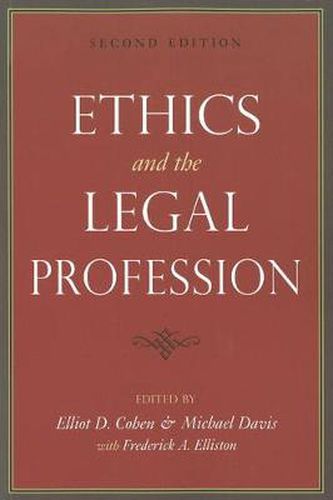Readings Newsletter
Become a Readings Member to make your shopping experience even easier.
Sign in or sign up for free!
You’re not far away from qualifying for FREE standard shipping within Australia
You’ve qualified for FREE standard shipping within Australia
The cart is loading…






Beneficial to the introductory law or philosophy student, Ethics and the Legal Profession comprises a selection of articles by eminent philosophers and lawyers that explore confrontations in the daily practice of law, employing in-depth case studies. The text is divided into six sections, each dealing with an important issue: The Structure of the Profession; The Moral Critique of Professionalism; The Adversary System; Conflict of Interest; Client Confidences; and, The Provision of Legal Services. Provoking questions on moral and professional responsibility, the ideology and tyranny of advocacy, and the professional’s right to case refusal are approached. The introduction to each section sets the stage for the paper to follow. Following each section is a summary and a list of suggested readings for further understanding. Readings have been selected to give a historical perspective showing a revolution in philosophy, conceptual analysis, and moral reasoning - due to the growing consensus about the need for some measure of reform in the legal profession. This study of ethics can help students and professionals draw a sharper distinction between ethical and technical judgements, and help them to become clearer about the meaning of moral discourse in the workplace. The book would make excellent reading in a law or philosophy course in professional responsibility.
$9.00 standard shipping within Australia
FREE standard shipping within Australia for orders over $100.00
Express & International shipping calculated at checkout
Beneficial to the introductory law or philosophy student, Ethics and the Legal Profession comprises a selection of articles by eminent philosophers and lawyers that explore confrontations in the daily practice of law, employing in-depth case studies. The text is divided into six sections, each dealing with an important issue: The Structure of the Profession; The Moral Critique of Professionalism; The Adversary System; Conflict of Interest; Client Confidences; and, The Provision of Legal Services. Provoking questions on moral and professional responsibility, the ideology and tyranny of advocacy, and the professional’s right to case refusal are approached. The introduction to each section sets the stage for the paper to follow. Following each section is a summary and a list of suggested readings for further understanding. Readings have been selected to give a historical perspective showing a revolution in philosophy, conceptual analysis, and moral reasoning - due to the growing consensus about the need for some measure of reform in the legal profession. This study of ethics can help students and professionals draw a sharper distinction between ethical and technical judgements, and help them to become clearer about the meaning of moral discourse in the workplace. The book would make excellent reading in a law or philosophy course in professional responsibility.